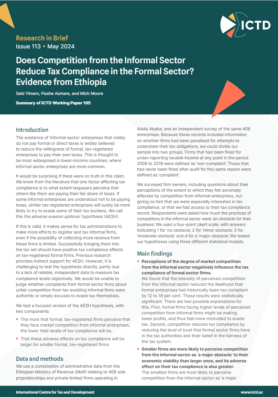Research in Brief 113
The existence of ‘informal sector’ enterprises that visibly do not pay formal or direct taxes is widely believed to reduce the willingness of formal, tax-registered enterprises to pay their own taxes. This is thought to be most widespread in lower-income countries, where informal sector enterprises are more common.
It would be surprising if there were no truth in this claim. We know from the literature that one factor affecting tax compliance is to what extent taxpayers perceive that others like them are paying their fair share of taxes. If some informal enterprises are understood not to be paying taxes, similar tax-registered enterprises will surely be more likely to try to evade some of their tax burdens. We call this the adverse evasion spillover hypothesis (AESH).
If this is valid, it makes sense for tax administrations to make more efforts to register and tax informal firms, even if the possibility of collecting more revenue from these firms is limited. Successfully bringing them into the tax net should have positive tax compliance effects on tax-registered formal firms. Previous research provides indirect support for AESH. However, it is challenging to test the hypothesis directly, partly due to a lack of reliable, independent data to measure tax compliance levels objectively. We would be unable to judge whether complaints from formal sector firms about unfair competition from tax-avoiding informal firms were authentic or simply excuses to evade tax themselves.
We test a focused version of the AESH hypothesis, with two components:
- The more that formal, tax-registered firms perceive that they face market competition from informal enterprises, the lower their levels of tax compliance will be.
- That these adverse effects on tax compliance will be larger for smaller formal, tax-registered firms.

